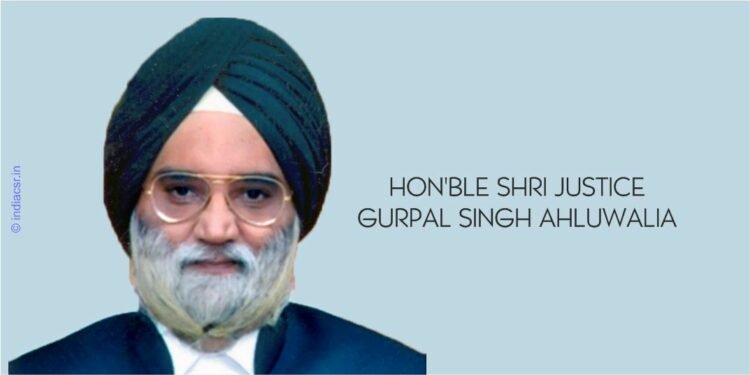We the people of India, having solemnly resolved to constitute India into a Sovereign, Socialist, Secular, Democratic Republic and to secure to all its citizens:
JUSTICE, social, economic and political; LIBERTY of thought, expression, belief, faith and worship; EQUALITY of status and of opportunity; and to promote among them all FRATERNITY assuring the dignity of the individual and the unity and integrity of the Nation; IN OUR CONSTITUENT ASSEMBLY this twenty-sixth day of November, 1949, do hereby adopt, enact and give to ourselves this Constitution.
The Preamble of our Constitution gives the glimpses of characteristic/system of our Government, therefore, each and every word is important and carries its significant meaning. However, the most important aspect of our Constitution is that we have given the same to ourselves i.e., every citizen of our Country has given the Constitution to themselves, therefore, our Constitution is the voice of the people and therefore, it indicates source i.e., the people and the Preamble is a part of the Constitution. It can be said to be a preliminary statement of the reasons which made the passing of Constitution necessary and desirable. The Preamble cannot be abrogated or wiped out. Therefore, thorough understanding of the Preamble is must.
Our country is a secular country, which means equal status to all religions without any preference in favour of any religion. Our Country is a Republic Country which means that we do not have monarchial headship and the head of the State is elected by the Citizens of this Country. Similarly, Socialist democracy aims to end poverty, inequality etc. Further, our Constitution secures Justice, freedom of expression, equality of opportunity etc. Judiciary is an important pillar of our Constitution because without justice no Government would last long.
Thus, justice is an important phenomenon in a civilized society. In short, justice, equality, freedom of expression, speech, movement, to practice any profession or carry any occupation trade or business, freedom of association, protection of life and liberty, Right to education etc. are some of the basic facets for dignified existence of mankind, and the same are provided in our Constitution.
The Fundamental Rights of every citizen are protected in Part III of our Constitution and these Rights are essential for intellectual, moral and spiritual development of citizens of India. Our Constitution has 6 Fundamental Rights i.e., Right to Equality, Right to Freedom, Right against Exploitation, Right to freedom of Religion, Cultural and Educational rights and Right to Constitutional remedies. Earlier, Right to Property was also one of the Fundamental Right, but now it is no more a Fundamental Right, but still the citizen of India has a statutory right of property.
Although, Fundamental Rights are important for dignified existence of every citizen of India, but the Fundamental Rights are not absolute and are subject to reasonable restriction. Reasonable restriction means that the State can curtail the these rights provided the restriction has reasonable nexus with the object sought to be achieved. However, there should be minimum invasiveness by the authorities, and the restrictions should be imposed only when they are unavoidable.
No one can be divested of his Fundamental Right because they are incapable of being taken away, and the reasonable restriction must pass the test
(i) that the restriction can be imposed only by or under the authority of law,
(ii) it cannot be imposed by exercise of executive power without any law to back it up and
(iii) it must have reasonable nexus with object sought to be achieved.
Although Part III which provides for Fundamental Rights is enforceable in the Courts, but Part IV, which speaks about the Directive Principles are not enforceable in the Courts and do not create any justiciable rights in favor of individuals, but the Directive Principles can be looked into for interpreting a Fundamental Right.
Part IV-A which speaks about Fundamental Duties. Part IV-A has been added by the Constitution (42nd amendment) in accordance with recommendations of Swaran Singh Committee. One thing is important that although Fundamental Duties are not enforceable by a writ of the Court, but yet it provide an important aid to interpretation of Constitutional and other legal issues.
For enforcement of Fundamental Rights of a citizen of India, the High Courts exercise their powers under Article 226 of the Constitution of India. Except the writ of Habeas Corpus or Quo Warranto, a writ under Article 226 of the Constitution would lie against State, which has been defined under Article 12 of the Constitution of India.
The definition of “State” had undergone various changes during various meetings of Constituent Assembly. Article 12 of Constitution, not only includes the Government, Parliament as well as State Legislature, but also includes Local Authorities and other Authorities. The “Other Authorities” mean any authority which has been created by law and have powers to make law, rules or regulations which may include Instrumentalities of Government, which are having independent status distinct from Government.
The Corporations and societies created by State would also fall within the definition of “Other Authorities”. Similarly, any Public Authority exercising statutory powers would also be “Other Authorities”. Further, even a body, discharging public duty or sovereign powers would also be “Other Authority”. And an instrumentality or agency would also fall within the definition of “Other Authority”. Similarly, a writ petition against a private person is not maintainable except in the nature of Habeas Corpus or Quo Warranto.
For example, If “State” encroaches upon the private land of a person, without acquiring the same or purchasing the same or taking on lease, or license or taking any right to enjoy the said property, then a Writ Petition under Article 226 of the Constitution of India would be maintainable before the High Court, but if any private person encroaches upon or violates any civil right of a fellow citizen, then he has to approach the Civil Court under General Law, and no writ petition under Article 226 of Constitution of India, would be maintainable. Thus, a writ petition would be maintainable only against the “State” for enforcement of Fundamental Right and no petition would lie against a private institution or person.
There are five writs, i.e. Writ of Habeas Corpus, Certiorari, Mandamus, Quo Warranto and of Prohibition. Habeas Corpus is a Latin word which means to have the body of. Thus, if a person is in an illegal detention of any person, whether Private or “State”, then this writ would be maintainable for producing the corpus.
Writ of Mandamus means seeking a command for the “State” or even a Private Body in respect of public functions being discharged by the said Body. Writ of Prohibition means seeking a writ to prevent from exercising powers beyond their jurisdiction. Writ of Certiorari means the authority exercised by Supreme Court or the High Court to set aside/quash the orders of the sub-ordinate Courts or inferior Tribunals. Writ of Quo Warranto means to challenge the eligibility of a public servant to hold a public post. Thus, for protection of Fundamental Rights, a citizen can approach the High Court or Supreme Court against the “State”.
Therefore, Fundamental Rights are not only essential for dignified existence of citizen of India, but the Constitution provides an effective forum for protection of the Fundamental Rights.
Although the Fundamental Duties were not the part of the Constitution of India, but it were incorporated by 42nd Amendment, therefore, if a citizen enjoys the Fundamental Rights, then he must follow his Fundamental Duties, although they are not enforceable through Courts. Fundamental Duties include to abide by Constitution and respect its ideals and Institutions, National Flag and National Anthem.
To uphold the sovereignty, unity and integrity of India, to defend the Country, to promote harmony and spirit of common brotherhood, to value and preserve the rich heritage of our composite culture, to develop scientific temper, humanism, to protect natural environment including forests, lakes, rivers and wildlife, to protect public property and to abjure violence, to strive towards excellence in all spheres of individual and collective activity and to provide opportunities for education to his child/ward upto the age of 14 years.
Thus, whereas the Fundamental Rights strive at peaceful and dignified existence of citizens of the Country, but at the same time, we must not forget that Fundamental Rights of a citizen can be protected only when the individual or the “State” always act in accordance with law. Being a responsible citizen of this Country, we must respect the Fundamental Rights of our fellow countrymen and must also try our level best to follow the Fundamental Duties, although the same are not enforceable through Courts.
Thus, where the protection of the Fundamental Rights of a citizen is the obligation of the “State” but at the same time, Fundamental Duties is the obligation of an individual towards the State.
To make a Country Secular, Socialist, the individuals also play a very important role. We cannot expect the “State” is to take the entire responsibility on its shoulder. Unless and until we act as per the law of the land by not violating the Fundamental or Statutory or Civil rights of our fellow citizens, only then we will be able to make our Country a Sovereign, Socialist, and Secular Democratic Republic.
The word Justice is not confined to protection of civil/statutory rights only, but it involves Socio economic and political justice also. Untouchability is not only an offence, but is also forbidden under Article 17 of the Constitution of India.
We must respect our fellow citizens because not only it amounts to humanity, but it is the basic fragrance and Colour of our Constitution. Therefore, now the time has come where instead of insisting upon protection of our Fundamental Rights, we must work together for protection of Fundamental as well as all types of Statutory Rights of our fellow citizens and if we succeed in changing our attitudes, then not only it will take our Country to a new heights and success, but it will improve our own personal attitude towards humanity, our resources, and economy etc.
(Source: 70 Years of Indian Constitution, Published by Govt. of India)






















